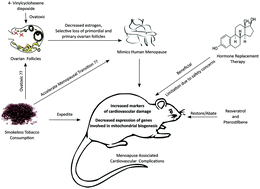Resveratrol and pterostilbene attenuated smokeless tobacco induced cardiovascular aberrations in estrogen deficient female rats
Abstract
This study evaluated the impact of resveratrol (RSV) and pterostilbene (PT) on the aqueous extract of smokeless tobacco (AEST) induced cardiovascular aberrations in estrogen deficient female Sprague-Dawley rats. Exposure to 4-vinylcyclohexene diepoxide (VCD) (80 mg kg−1, i.p.) for 30 days induces estrogen deficiency. The rats were administered AEST alone or AEST along with resveratrol and/or pterostilbene. Several markers of cardiovascular health were estimated to evaluate the repercussion of the exposures. RSV and PT per se and in combination significantly reversed the derangements caused by AEST. RSV decreased the atherogenic index and systolic blood pressure and normalized ECG. RSV and PT treatment markedly decreased aortic collagen, cardiac-carbonylated proteins, serum creatine-kinase, cholesterol, LDH, LDL, VLDL, CRP and TNF-α levels. Conversely, they increased serum nitrate–nitrite and HDL levels. The drugs improved the gene expression of SIRT1, PGC-1α, PPAR-α, TFAM, NRF-1 and mtDNA in the cardiac tissue. However, the expression of SIRT1 was not modified by PT. These favorable effects were comparable to those of estradiol therapy. Histopathological outcomes also corroborated these benefits. Thus, resveratrol and pterostilbene abrogated the deleterious effects of AEST on cardiovascular parameters in estrogen deficient female rats.


 Please wait while we load your content...
Please wait while we load your content...